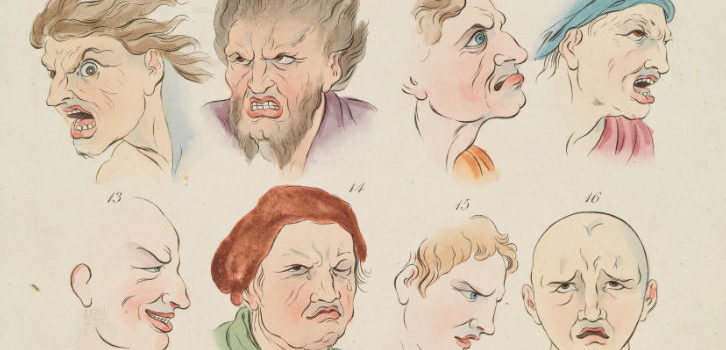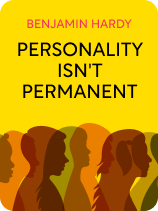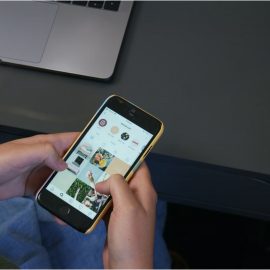

This article is an excerpt from the Shortform book guide to "Personality Isn't Permanent" by Benjamin Hardy. Shortform has the world's best summaries and analyses of books you should be reading.
Like this article? Sign up for a free trial here.
How can you change your personality? Is personality change even possible?
According to psychologist Benjamin Hardy, personality change is not easy, but it’s possible—contrary to what most people believe. The first step, he says, is to envision and decide who you want to become. Next, you must structure your life in accordance with that vision.
With this in mind, here’s how to change your personality, according to Hardy.
Personality Change Starts With Deciding Who You Want to Become
In his book Personality Isn’t Permanent, psychologist and motivational blogger Benjamin Hardy explains how to change your personality. The first step, he says, is to change the way you live. Hardy explains that most people cater to their limitations and structure their lives based on their current personality—but by acting and thinking the way they’re used to, they live a life that maintains their existing personality.
Instead, you’ll want to envision your optimal self and structure your life around this vision—thinking and acting in ways that will help you become more like them. Eventually, you’ll be the person you want to be, living the life you want to live.
(Shortform note: While Hardy argues that you must push yourself to break out of a growth-averse life of comfort and habit, positive personality change actually happens for most people—regardless of commitment or effort. Psychologists explain that over time, the majority of people become more outgoing, mature, disciplined, and agreeable, whether or not they’ve dedicated their lives to growth. Still, Hardy suggests that taking an intentional approach to change can help you grow in much more drastic and beneficial ways than you might with a passive approach.)
However, Hardy notes, changing the way you live your life based only on a vision of a better future is unlikely to be as successful. He argues that you’ll also need a clear framework to guide your thoughts and actions if you want to make significant changes to yourself. In this section, we’ll discuss why Hardy believes that a clear framework for change makes it easier to succeed, his argument that a single primary goal is the best framework for change, and what things to consider when choosing a single primary goal.
Choose a Single Primary Goal
If you try changing your personality based only on a vague vision of a better future, you’ll struggle more than necessary. Without a clear direction, you won’t feel sure about what you should change or how. A better strategy, Hardy suggests, is choosing a single primary goal to work toward. This goal should be one that will help you become your optimal self so that making progress on your clear goal equals making progress on the more vague process of changing into the person you want to be.
| Why You Need Both a Vision and a Goal It’s not immediately clear why Hardy argues that you need both a vision of your optimal self and a goal based on becoming this optimal self. In Switch, Chip and Dan Heath explain that while having a vision of where you’d like to go can be a powerful, emotional motivator, it’s often too vague to inspire action. It’s hard to know how to get started moving toward that envisionment, and it’s nearly impossible to measure your progress as you go. On the other hand, coming up with a clear goal moves you into the “doing” phase of finding ways to move forward, and it’s easier to measure your progress. For example, while, “Be a more laid-back person” is a desirable vision, it’s not clear how you’d be more laid-back or know when you achieved it. However, you can translate this vision into a clear goal: “Be someone who never thinks about their job outside of work hours.” This inspires some immediate solutions, such as logging off at a strict time every day. And, it’s relatively measurable—while you can’t count “laid-backness,” you can count how many times you think about work in a day or week. |
Why You Should Choose Just One Primary Goal
It might seem counterintuitive and inefficient to focus on one primary goal instead of several—since changing your personality requires changing many things about yourself. Why choose just one? Hardy argues that choosing one primary goal has two benefits: It’s easier to focus on, and it helps you make progress on other goals as well.
Benefit #1: One Goal Is Easier to Focus On
Hardy explains that having just one goal simplifies your pursuit of your optimal self because you can make all your decisions through a simple lens: Weigh each decision in your life based on whether it helps or hinders you in reaching your goal.
As a result, you have a much clearer idea of what you should do and why than if you were to juggle multiple primary goals or decide what changes or improvements will be “best” without guidelines.
Benefit #2: Progress on One Primary Goal Leads to Progress on Other Goals
Additionally, Hardy asserts that choosing a single main goal doesn’t mean you have to sacrifice making progress on other goals. The progress you make and the confidence you earn in one area of your life, he says, will spill over into other areas. This is largely because making progress on your primary goal gives you a feeling of momentum that makes it easier and more rewarding to do hard, uncomfortable things across the board.
Additionally, in your pursuit of your primary goal, you’ll end up making—and meeting—all kinds of supporting “secondary goals” along the way.
For instance, imagine you’ve been working towards your primary goal of getting a promotion at work. To support this goal, you create the secondary goal of getting in shape because doing so will give you more energy to work hard and earn that promotion. Going to the gym will help you progress toward your primary goal of promotion, making you feel excited to make even more progress. As a result, you’ll find it much easier to make a habit of going to the gym.
| The Realistic Benefits of Limiting Your In-Progress Goals In Four Thousand Weeks, Oliver Burkeman elaborates on the benefits of limiting the number of goals you’re working on. While he doesn’t go so far as to suggest pursuing a single primary goal like Hardy, he poses a similar argument: that working on just a few goals at a time is more efficient than working on many at once. According to Burkeman, this is due to the fact that making efficient progress on a goal requires you to dedicate significant amounts of focused time to it. Frequently switching which goals you’re working on may feel productive, but it’s inefficient because you can’t commit enough time and energy to any one of them to make real progress. While both Hardy and Burkeman assert that working on fewer goals allows you to get more things done, Burkeman seems to believe that we aren’t capable of accomplishing as much as Hardy says we are. Hardy specifies that progress on the single primary goal leads to progress in “every” area of your life—implying that you can accomplish most of the things you want to. Burkeman, on the other hand, argues that—thanks to our limited time as mortals—we can never accomplish as much as we want. As a result, trying to accomplish everything is an unhealthy way to live and leads to burnout. Instead of trying to “do it all” via a primary goal and its supporting goals, Burkeman suggests giving yourself permission to only accomplish some of the goals you want—in other words, to accept your finitude as a mortal person. |

———End of Preview———
Like what you just read? Read the rest of the world's best book summary and analysis of Benjamin Hardy's "Personality Isn't Permanent" at Shortform.
Here's what you'll find in our full Personality Isn't Permanent summary:
- How personality is not fixed, but fluid and changeable
- How the narratives you tell yourself dictate what you’re capable of
- How to change your personality to become your optimal self






